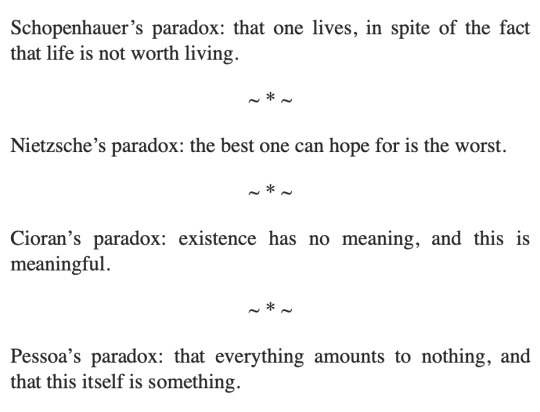#schopenhauer philosophy
Explore tagged Tumblr posts
Text
When someone tells you in the general anti-intellectual scene of these end days of the world that college is a bad investment or indoctrinating kids etc etc, just agree with them and give them some version of this quote from Schopenhauer lamenting that college-level education was too focused on his personal nemesis Hegel instead of more worthy minds like Kant.
"Now if it is said that ‘Sound reason teaches this’, or that ‘Reason should rein in the passions’ and the like, then in no way does this mean that reason produces material knowledge from its own means; rather, this points to the results of rational reflection, to logical inferences from principles that abstract knowledge, enriched by experience, has gradually gained, and by virtue of which we can clearly and readily survey not merely that which is empirically necessary and hence to be foreseen, should the occasion arise, but the grounds and consequences of our own deeds as well. ‘Rational’ or ‘reasonable’ is everywhere synonymous with ‘consistent’ or ‘logical’, and the opposite is also true. For indeed, logic is just the natural method of reason itself expressed as a system of rules: these expressions (rational and logical) are related to one another as are practice and theory. A rational way of acting is understood in just this sense as a way of acting that is quite consistent, proceeds from universal concepts, and is intentionally led by abstract thoughts, but not determined by momentary, fleeting impressions; however, nothing is said about the morality of such a way of acting; on the contrary, it could be bad as well as good. Detailed explanations of this can be found in my ‘Critique of [117] Kantian Philosophy’ 2nd edn, p. 576 ff.,b as well as in The Two Fundamental Problems of Ethics, p. 152 ff.c Finally knowledge from pure reason (knowledge that we can bring to consciousness a priori, i.e., without the aid of experience) is such that its origins lie in the formal part of our cognitive faculty, be it thinking or intuiting. This sort of knowledge is always based on propositions that have transcendental or even metalogical truth.
In contrast, the idea of reason through its own means providing original material knowledge, knowledge therefore beyond all possibility of experience, positively enlightening us – the idea of reason as something that must contain innate ideas – is a pure fiction of philosophy professors, resulting from the anxiety evoked in them by the Critique of Pure Reason. – Are these gentlemen acquainted with a certain Locke, and have they read him? Perhaps once, a long time ago, superficially, in passages, in a poor, hackneyed German translation, looking down on the great man with conscious superiority – for I do not see an increase in knowledge of modern languages in proportion to the decrease in knowledge of ancient languages, no matter how much it is lamented. Of course they have had no time to waste on such old curmudgeons; in fact, even a real and fundamental knowledge of Kantian philosophy is at most to be found in some – very few – old fellows. For the youth of the generation now in manhood must have been expended on the works of that ‘giant intellect, Hegel’, of the ‘great Schleiermacher’ and the ‘discerning Herbart’. Alas! Alas! Alas! For this is just what is pernicious about such university celebrities and about what comes out of the mouths of decent colleagues in office and aspirants hoping to rise to the heroic heights of a university chair: that mere products of the factory of nature are praised as great minds, as the exceptions and ornaments of humankind, to good, faithful, youth of mediocre minds, lacking in judgement, so that these students dedicate themselves, with all their youthful energy, to the sterile study of such people's endless and mindless scribbling and squander the short and valuable time granted to their higher education, instead of devoting their youthful energy to real instruction, offered [118] by the works of rare, genuine thinkers, the true exceptions among humankind, ‘scattered swimmers in the vast abyss’,a who across the centuries have only now and then emerged, since even nature only occasionally produces their sort and then ‘breaks the mould’. These genuine thinkers would also have been alive for today's youth, had they not been cheated out of their share of these genuine thinkers by the exceeding perniciousness of those who praise the bad, those members of the great fellowship of sponsors of mediocre thinking, who always flourish and hoist their banners high as the regular enemies of the great and genuine, who humble them. Just because of these and their activities, the age has so declined that Kantian philosophy, which our fathers understood only after years of serious study and through great effort, has now become unknown to the current generation, before whom Kant's philosophy is like pearls before swinea and who try to attack it in a kind of crude, awkward, doltish way – as barbarians throw stones at statues of Greek gods unfamiliar to them. Because this is the way it is nowadays, it is incumbent upon me to recommend something new to the advocates of that reason that knows immediately – that comprehends, that intuits, in short, that reason that produces material knowledge from its own means – to recommend the first book of the world-famous, 150-year-old work of Locke, which is expressly directed against all innate knowledge, and especially to recommend the 3rd chapter, §§ 21–26.b For although Locke goes too far in his denial of all innate truths, insofar as he extends that denial to formal knowledge (for which Kant most brilliantly corrected him later), nonetheless he was perfectly and undeniably correct about all material knowledge, i.e., substantial knowledge."
-Arthur Schopenhauer, On the Fourfold Root of the Principle of Sufficient Reason
#philosophy#college#education#quotes#indoctrination#college indoctrination#trolling#copypasta#shitpost#right wing troll#philosophy of education#schopenhauer#hegel#educational indoctrination#college education#philosophy quotes#schopenhauer philosophy#philosophy trolling#amreading
1 note
·
View note
Text

E. Gryzanovski, "Arthur Schopenhauer and His Pessimistic Philosophy"
521 notes
·
View notes
Quote
Boundless compassion for all living beings is the surest and most certain guarantee of pure moral conduct, and needs no casuistry. Whoever is filled with it will assuredly injure no one, do harm to no one, encroach on no man's rights; he will rather have regard for every one, forgive every one, help every one as far as he can, and all his actions will bear the stamp of justice and loving-kindness.
Arthur Schopenhauer, On the Basis of Morality
764 notes
·
View notes
Text
We are always living in expectation of better things, while at the same time we often repent and long to have the past back again. We look upon the present as something to be put up with while it lasts, and serving only as the way towards our goal. Hence most people, if they glance back when they come to the end of life, will find that all along they have been living ad interim; they will be surprised to find that the very thing they disregarded and let slip by unenjoyed was just their life--that is to say, it was the very thing in the expectation of which they lived. Of how many a man may it not be said that hope made a fool of him until he danced into the arms of death. - Arthur Schopenhauer, German philosopher (1788-1860)
86 notes
·
View notes
Text
“Truth that is naked is the most beautiful, and the simpler its expression the deeper is the impression it makes.” - Arthur Schopenhauer
136 notes
·
View notes
Text

#philosophy#quotes#Arthur Schopenhauer#Counsels and Maxims#Schopenhauer#politeness#rudeness#manners#etiquette#civility#ethics#wisdom
186 notes
·
View notes
Text

— Arthur Schopenhauer, Parerga and Paralipomena: Short Philosophical Essays, Vol. 2
65 notes
·
View notes
Text

“Talent hits a target no one else can hit; Genius hits a target no one else can see.”
— Arthur Schopenhauer
#arthur schopenhauer#schopenhauer#literature#lit#literture lover#literature quote#literature quotes#philosophy#philosophical#philosopher#philosophers#philosophy of life#philosophy quote#philosophy quotes#quote#quotes#excerpts#excerpt#literature lover#quoteoftheday#booklover#book#bookworm#books#booklr#book quotes#book quotations
133 notes
·
View notes
Text
Truth that has been merely learned is like an artificial limb, a false tooth, a waxen nose; at best, like a nose made out of another's flesh; it adheres to us only because it is put on. But truth acquired by thinking of our own is like a natural limb; it alone really belongs to us. This is the fundamental difference between the thinker and the mere man of learning. The intellectual attainments of a man who thinks for himself resemble a fine painting, where the light and shade are correct, the tone sustained, the color perfectly harmonized; it is true to life. On the other hand, the intellectual attainments of the mere man of learning are like a large palette, full of all sorts of colors, which at most are systematically arranged, but devoid of harmony, connection and meaning. Reading is thinking with some one else's head instead of one's own. To think with one's own head is always to aim at developing a coherent whole, a system, even though it be not a strictly complete one; and nothing hinders this so much as too strong a current of others' thoughts, such as comes of continual reading. These thoughts, springing every one of them from different minds, belonging to different systems, and tinged with different colors, never of themselves flow together into an intellectual whole; they never form a unity of knowledge, or insight, or conviction; but, rather, fill the head with a Babylonian confusion of tongues. The mind that is overloaded.
The Art of Literature
Arthur Schopenhauer
82 notes
·
View notes
Text

Arthur Schopenhauer, ''Die Kunst und das Schöne Heim'', #3, Dec. 1958
"Die Zeit ist eine Vorstellung, aus der sich alles wegdenken läßt, nur nicht sie selbs" (Time is an idea from which everything can be thought away* except itself) *can also be translated as "removed"
#arthur schopenhauer#die kunst#philosophy#schopenhauer#german philosophy#The World as Will and Representation#the world as will and idea#German Idealism
29 notes
·
View notes
Text

Eugene Thacker, Infinite Resignation
#eugene thacker#infinite resignation#arthur schopenhauer#friedrich nietzsche#emil cioran#fernando pessoa#philosophy#p
2K notes
·
View notes
Text

“It is difficult to find happiness within oneself, but it is impossible to find it anywhere else.”
Arthur Schopenhauer
26 notes
·
View notes
Text
michael's arc being "guy pretends to be a specific brand of good as a torture method, realizes good and evil are fucked up, realizes good and evil are absurd, realizes the good thing is actually like. a nice leap of faith to take and it truly is about the friends we made as humans are beings of the narrow who literally Die and there's not really anything beyond oblivion" is certainly very entertaining
BUT specifically the way it's brought with the larger philosophy of it in mind? obviously the first season is a huis clos reference and shit ("hell is other people" play where the concept is lock assholes in a mirrorless room and have them torturously get to know each other and when they realize they only realy exist as a dimensionally reduced versions of themselves in the heads of other people they are driven suicidal) (and Michael does have Sartre glasses)
Sartre's existentialist works often grappled with "are we doomed to cruelty by our simultaneous selfish and social natures?" which is honestly what prompts michael to get a little bit insane about the reboots. he knows that humans are both selfish and social and he believes that the combination WILL doom humanity. and then these assholes win by being eusocial which was not in the cards for the "every human since the industrial revolution comes here" bad place. and that plants the seed of absurdist doubt michael's personal development is really quite honestly mostly contained within contemporary philosophy because it IS the one that grapples with disbelief and disillusionment and agency in a way that does not presume an idea of fairness and goodness and God as Real categories (nietzsche/marx/freud and the hermeneutics of suspicion as the non-unseeable critiques of religion and godliness AND, SUBSEQUENTLY, LIFE BEYOND DEATH that kickstarts the 20th century's existential crisis)
michael is an immortal demon with no perspective on... death! until he gets one. and this also means he knows good and evil are just practical categories. so he goes from full relativism, to an existential crisis, to jouissance and nihilism, to absurdism.
nothing i do really has any moral weight because the evil acts are good for the bad place. but that means my actions mean nothing and also if i don't act i will cease to exist. the jouissance happens when he eventually realizes that he is doomed and so are the 4 humans and janet and he can just... do things in the meantime. why not make them good? and then the last season with the humans 2.0 is like... wow. the universe is chaotic, it hurts, and it holds no answers beyond the ones i might make out of this misery to keep going and hey. there's joy in trying. there's joy in fucking up solution 1001 and trying again.
which is FASCINATING when you compare it to the journey of the humans which does go through the entirety of world philosophy history because... they're human adults. they already know death. they already know all the shit that michael went through. but then they live their lives a million times, they travel the history of ethics chronologically (virtue ethics, deontology, consequentialism, utilitarianism, contractualism... and their epistemological counterparts which rely on memory, identity, truth, and belief and are honestly too many to list) and it always comes back to camus' myth of sisyphus:
the only question that matters in philosophy is suicide. why don't we all just kill ourselves/surrender to the bad place?
because one must imagine sisyphus happy. because there is meaning and happiness to be found in an universe that inherently holds none.
#the good place#tgp#michael tgp#do people tag him as michael realman on here? please. please do it if you aren't#philosophy#to everyone whom i ever told “yeah i went into philosophy for my higher education” and responded “oh you'd love the good place”#it took me 7 years but. I watched it! and i liked it a lot!#shoutouts to pyrrhonism and absurdism and my boy camus#minor squeak for kierkegaard he's lovely but like a wimpy schopenhauer (fond and approving)#binomechanisms
21 notes
·
View notes
Text


“In Sisyphus, we can suddenly see Camus' basic mistake. Life, he explains, is "absurd"—meaningless. You get up in the morning, go to work, spend four hours in the office or factory, eat lunch, work four more hours, go home, eat, sleep, for five days a week— endlessly. And one day you suddenly feel a great weariness and ask: "Why?" One stage further still, and you begin to experience what Sartre calls "nausea," "sensing to what degree a stone is foreign and irreducible to us, with what intensity nature or landscape can negate us. At the heart of all beauty lies something inhuman. . . ." We manage to live with material objects by imposing our feelings on them, until the truth dawns upon us. You see a man in a telephone booth, and again you become aware of the absurd. All of his expressions are part of a dumb show.
This last example really gives the game away. For this kind of absurdity is untrue. Camus' absurdity is not reality seen naked; it is reality deliberately distorted or drained of meaning. To point to a reality drained of meaning, and then to claim that this example proves reality itself is meaningless, is a strange kind of logic. Camus' vision of the world is the vision of a young romantic, heavily tinged with self-pity and a sense of personal inadequacy. Nietzsche began his career in much the same way, by swallowing Schopenhauer in one monstrous gulp, and then groaning with indigestion for two or three years. But Nietzsche outgrew his juvenile pessimism, and created Zarathustra. Camus found the process of transition slower and more painful, because he insisted on clinging to the fallacy that "absurdity" (or "nausea") is a vision of the fundamental truth—life seen without illusions. His failure to see through the fallacy is typical of the lack of logic that characterizes French philosophy in general.” - Colin Wilson, ‘“Lucky” Camus’ (August 1979)
#colin wilson#camus#albert camus#sartre#jean paul sartre#nietzsche#schopenhauer#existentialism#absurdism#nihilism#philosophy#france#french#zarathustra#sysiphus
19 notes
·
View notes
Text


"We should depart from life as Odysseus parted from Nausicaa — blessing it rather than in love with it." ― Nietzsche, Beyond Good and Evil
Painting: "Odysseus and Calypso" by Frank Buchser
#franz kafka#poetry#albert camus#classical quotes#sylvia plath#literature#quotes#classics#booklr#classical literature#nietzche#friedrich nietzsche#thus spoke zarathustra#beyond good and evil#arthur schopenhauer#philosophy#homeric epics#greek literature#greek tumblr#greek mythology#greek gods#greek quotes#the odyssey#the iliad#the song of achilles#a thousand ships#classic literature#literary quotes#spilled writing
24 notes
·
View notes
Text

“All happiness is of a negative rather than positive nature, and for this reason cannot give lasting satisfaction and gratification, but rather only ever a release from a pain or lack, which must be followed either by a new pain or by languor, empty yearning and boredom.”
-Arthur Schopenhauer
#Schopenhauer#the world as will and representation#happiness#nietzsche#philosophy#Europe#European thought
34 notes
·
View notes